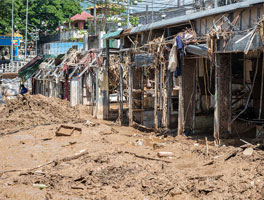 |
Dear readers,
Welcome to the Climate Weekly newsletter by the Centre for Science and Environment’s Climate Change programme and Down to Earth.
During the first week of the mid-year UN climate conference in Bonn, discussions on the UAE Just Transition Work Programme (JTWP) witnessed sharp divergences between developing and developed country blocs. The JTWP was established at COP28, but its scope and operationalisation are under negotiation with the aim of delivering a draft decision at the upcoming COP30 in Belem.
CSE Climate’s Rudrath Avinashi writes about the proceedings, highlighting how developing countries called for discussions on unilateral trade measures (UTMs) and equity within the JTWP. They asserted that UTMs disrupt sustainable development and that there can be no one-size-fits-all model for just transitions, championing nationally determined development pathways. Developed countries, however, focused on aligning just transition pathways to the goal of limiting global warming to 1.5°C. They also stressed that nationally determined contributions (NDCs), National Adaptation Plans (NAPs) and Long-Term Low Emission Development Strategies (LT-LEDS) should incorporate just transition. Avinashi underscores that reaching consensus from here will require negotiations in good faith.
To understand the role of UTMs and why it emerged as a flashpoint during the first week of Bonn, CSE Climate’s Trishant Dev explores how UTMs came into the spotlight with the European Union’s adoption of the Carbon Border Adjustment Mechanism (CBAM). Dev writes that such actions, taken by individual countries or blocs, are introduced as climate action policies and aim to put a price on carbon embedded in imported goods—which developing nations view as unfair and contrary to multilateralism.
Discussions on UTMs have occurred at COP28, COP29 and forums beyond the United Nations Framework Convention on Climate Change (UNFCCC). Developing blocs have asked for such measures to be remedied—citing international agreements which emphasise that climate related measures should not result in unfair discrimination or disguised trade restrictions, and that such measures should aim to minimise their impact on developing countries.
Further, with the Bonn Climate Conference coming to a close at the end of last week, our reactions and analysis of the conference will follow soon during this week.
Lastly, the second episode of our new podcast series will be released on Saturday, June 28. Tune in for a discussion by Avantika Goswami and Romain Ioualalen on the 2023 Global Stocktake outcome and what the way ahead looks like.
|
|
 |
| |
 |
|
| |
 |
 |
| |
By - Upamanyu Das
Climate Change, CSE
|
| |
|
 |
|
|
| |
 |
|
| |
| EXTREME WEATHER TRACKER |
| |
Asia heating up twice as fast as rest of globe, WMO warns, 23 June 2025
|
 |
 |
|
|
| |
 |
|
| |
|
|
| |
|
|
| |
|
|
| |
 |
|
| |
|
|
| |
 |
|
| |
CLIMATE NEWS | SCIENCE| IMPACTS| POLITICS |
|
| |
 |
|
| |
|
|
| |
 |
|
| |
|
|
| |
 |
|
| |
|
|
| |
 |
|
| |
|
|
| |
 |
|
| |
|
|
| |
 |
|
| |
|
|
| |
 |
|
| |
|
|
| |
 |
|
| |
|
|
| |
 |
|
| |
|
|
| |
 |
|
| |
|
|
| |
 |
|
| |
|
|
| |
 |
|
| |
|
|
| |
|
|
| |
| Onsite Training Course |
|
Podcast: Carbon Politics |
| |
|
|
|
|
|
|
| |
|
|
| Gobar Times |
| |
|
|
 |
|
|
| |
|
|